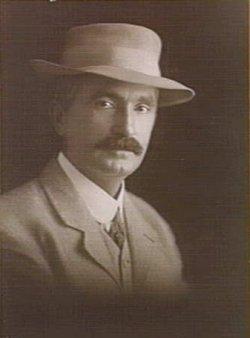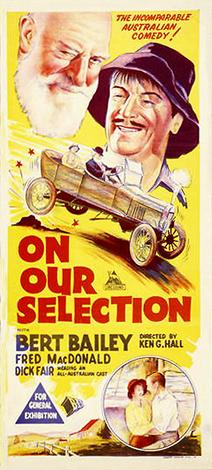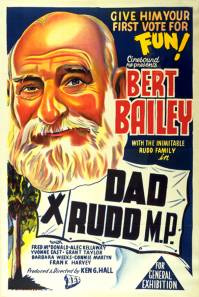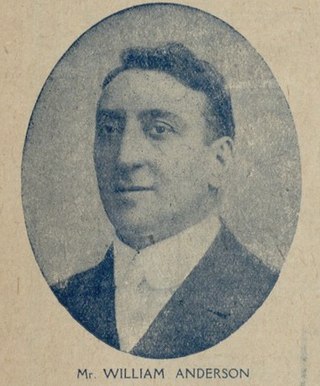
Steele Rudd was the pen name of Arthur Hoey Davis an Australian author, best known for his short story collection On Our Selection.

Kenneth George Hall was an Australian film producer and director, considered one of the most important figures in the history of the Australian film industry. He was the first Australian to win an Academy Award.

Cinesound Productions Pty Ltd was an Australian feature film production company. Established in June 1931, Cinesound developed out of a group of companies centred on Greater Union Theatres that covered all facets of the film process, from production to distribution and exhibition. Cinesound Productions established a film studio as a subsidiary of Greater Union Theatres Pty Ltd based on the Hollywood model. The first production was On Our Selection (1932), which was an enormous financial success.

Dad and Dave Come to Town is a 1938 Australian comedy film directed by Ken G. Hall, the third in the 'Dad and Dave' comedy series starring Bert Bailey. It was the feature film debut of Peter Finch and is one of the best known Australian films of the 1930s.

On Our Selection is a 1932 comedy based on the Dad and Dave stories by Steele Rudd. These had been turned into a popular play by Bert Bailey and Edmund Duggan in 1912, which formed the basis for the screenplay. Bailey repeats his stage role as Dad Rudd. He also wrote the script with director Ken G. Hall.
The Squatter's Daughter is a 1933 Australian melodrama directed by Ken G. Hall and starring Jocelyn Howarth. One of the most popular Australian films of the 1930s, it is based on a 1907 play by Bert Bailey and Edmund Duggan which had been previously adapted to the screen in 1910.

Grandad Rudd is a 1935 comedy featuring the Dad and Dave characters created by Steele Rudd and based on a play by Rudd. It was a sequel to On Our Selection, and was later followed by Dad and Dave Come to Town and Dad Rudd, MP.

Dad Rudd, M.P. is a 1940 comedy that was the last of four films made by Ken G. Hall starring Bert Bailey as Dad Rudd. It was the last feature film directed by Hall prior to the war and the last made by Cinesound Productions, Bert Bailey and Frank Harvey.
South West Pacific is a 1943 propaganda short Australian film directed by Ken G. Hall which focuses on Australia as the main Allied base in the South West Pacific area. Actors depict a cross section of Australians involved in the war effort.

Our Friends, the Hayseeds is a 1917 Australian rural comedy from director Beaumont Smith. It centers on the rural family, the Hayseeds, and their rivalry with a neighbouring family, the Duggans.

Edmund Duggan was an Irish-born actor and playwright who worked in Australia. He is best known for writing a number of plays with Bert Bailey including The Squatter's Daughter (1907) and On Our Selection (1912). His solo career was less successful than Bailey's. His sister Eugenie was known as "The Queen of Melodrama" and married noted theatre producer William Anderson, for whom Duggan frequently worked as an actor, writer and stage manager.
On Our Selection is a 1912 Australian play by Bert Bailey and Edmund Duggan based on the stories with the same name by Steele Rudd. Bailey played Dad Rudd in the original production.
The Squatter's Daughter or, The Land of the Wattle is a 1907 Australian play by Bert Bailey and Edmund Duggan, writing under the combined pseudonym Albert Edmunds.
On Our Selection is a 1920 Australian silent film directed by Raymond Longford based on the Dad and Dave stories by Steele Rudd.
Fred MacDonald (1895–1968), was an Australian actor best known for playing Dave Rudd opposite Bert Bailey on stage and screen, starting with the original 1912 production of On Our Selection. He also played a similar role, Jim Hayseed, several times on screen for director Beaumont Smith.
Talone Ordell (1880–1948), better known as Tal Ordel, was an Australian actor, writer and director. Ordell was probably born in Calcutta, India, seventh child of Victorian-born parents William Odell Raymond Buntine, drover, and his wife Susanna, née Mawley. He worked extensively on stage and screen as an actor in the 1910s and 1920s, playing Dad Rudd twice for Raymond Longford and Dad Hayseed – a similar role – three times for Beaumont Smith. He was the original "Ginger Mick" in the stage version of The Sentimental Bloke. He toured Australia with Marie Tempest.
The Squatter's Daughter is a 1910 Australian silent film based on the popular play by Bert Bailey and Edmund Duggan.

William Anderson was an Australian theatre entrepreneur.
On Our Selection (1899) is a series of stories written by Australian author Steele Rudd, the pen name of Arthur Hoey Davis, in the late 1890s, featuring the characters Dad and Dave Rudd.
Thunderbolt is a 1905 Australian play about the bushranger Captain Thunderbolt, based on the book Three Years with Thunderbolt by William Monckton.










